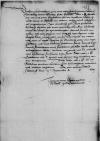Aus E(uer) E(rbarkei)t ⌊⌋, / dem wir auch gerne zugefallenn, / hab wir derselbtenn vleissig gemütte, / damit die botschafft ane weiteren vortzog wurde voltzogenn, / wol eingenhomenn. / Wie wunderlich aber soviel hindernus sich darzu begebenn, / gibt unns weitleuftig bedenckenn, / furderlich dieweil der gros(mechti)ge her ⌊marienburgischer woywode⌋ daraus inn andere orth wirt getzogenn, / ane welch(en) beÿ diesser legacion nichts fueglichs kann ausgerichtet werden. / Derwegenn von nötenn will seinn, / uf negster ⌊thagfart⌋ zu ⌊Graudentz⌋ weiter inn diesen zufellenn / rath unnd beredung zuhaltenn, / damit dennoch ⌊dieser lannde⌋ privilegienn unnd freyheitenn gehulffen werde / unnd unvorlassenn bleiben, / wovonn, / wie gemelt, / was die noturfft wirt furderenn, / die herren ⌊dieser lande rethe⌋ / neben E(uer) E(rbarkei)t geschicktenn / auf s(ankt) Michels angesatztenn thag[1] / handlung werdenn vornhemenn. / Solchs haben wir E(uer) E(rbarkei)t, / die wir gottlichenn gnadenn bevelhenn, / zum freuntlichenn antwurt / nicht wollenn vorhaltenn. /


 APG 300, 53, 269, p. 126
APG 300, 53, 269, p. 126